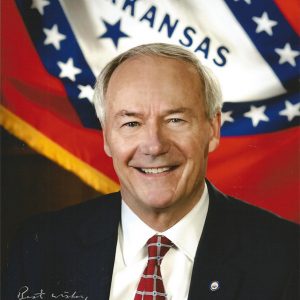calsfoundation@cals.org
Act 975 of 2015
aka: Religious Freedom Restoration Act
The Arkansas Religious Freedom Restoration Act (SB975 of the 2015 regular legislative session) was passed overwhelmingly by both houses of the Arkansas General Assembly and signed into law as Act 975 by Governor Asa Hutchinson. It closely aligns Arkansas law with the federal Religious Freedom Restoration Act (RFRA) of 1993. Under the legislation, any governmental action in Arkansas that is a “substantial burden” to an individual’s free exercise of religion may only stand if it furthers a “compelling governmental interest” in the “least restrictive” manner possible. Like the federal RFRA, the Arkansas RFRA was meant to return to the “balancing test” established by the U.S. Supreme Court in Sherbert v. Verner (1963) but overturned in the 1990 Employment Division v. Smith case. As one of the law’s sponsors, state Representative Bob Ballinger, a Republican from Hindsville (Madison County), put it: “What we’ve done is Arkansas-ized it I guess and made [it] apply to Arkansas code.”
SB975 was not the legislation originally envisioned by Ballinger and other social conservative allies in the legislature. Instead, it was a last-minute replacement for HB1228, a piece of legislation passed by both houses of the General Assembly that was considerably broader in its reach. That proposed legislation—called the “Conscience Protection Act”—would have allowed individuals and businesses to discriminate against others when state actions led to violations of their religious beliefs. Although the legislation did not specifically mention policies related to lesbian, gay, bisexual, and transgender (LGBT) citizens, the debate occurred in the context of pending rulings in both the Arkansas Supreme Court and U.S. Supreme Court that promised to legally recognize same-sex marriages (such rulings did subsequently come in late June 2015), and advocates did cite same-sex marriage laws as one reason they deemed the passage of the law necessary; indeed, this topic dominated the debate on the law.
Although HB1228 easily passed the House of Representatives with seventy-two votes in its favor early in the legislative session, its passage was stymied in the Senate Judiciary Committee—evenly split between Republican and Democratic senators—for several weeks. Then, pressured by the governor’s office (including unsubstantiated reports of exchanging a gubernatorial appointment of a local public official for the vote), Democratic senator David Burnett from Osceola (Mississippi County) changed his position and supported sending the legislation to the full Senate. There, the legislation easily passed. Hutchinson’s engagement in shifting Burnett’s support on the bill was made more confusing by later actions by the governor.
This Senate activity set off sustained protests by both Arkansas-based and national civil rights groups (such as the Human Rights Campaign) during the several days of Senate passage along with action by the House necessary to reconcile minor differences between the House and Senate versions of the legislation. A number of mainline religious leaders, including the bishop of the Arkansas Conference of the United Methodist Church, raised concerns about the legislation’s impact. (Notably, conservative religious groups rallied in support of the legislation during this period.) Probably even more relevant, a number of national and Arkansas business leaders (including those representing Walmart and Acxiom) expressed their deep concerns about the legislation’s impact on the business climate in the state. These businesses’ concerns were informed by the national backlash against a similar piece of legislation in Indiana passed in the days immediately before.
The morning following final House action in which HB1228 was ratified, Governor Hutchinson held a press conference in which he asked the legislature to recall the legislation from his desk to take action that would more closely mirror the federal RFRA. He said that this was to show the nation that Arkansas “does not discriminate and understands tolerance.” In making the request, Hutchinson cited his son’s opposition to the legislation as evidence of the “generational difference of opinion on these issues.” During the press conference, Hutchinson also raised the possibility of an executive order barring discrimination in state government, but Hutchinson later said such an order was unnecessary.
Legislators made use of an existing “shell bill” (a bill introduced with only a title but not content) as the vehicle for the new legislation. Although some argued that this final legislation was also unnecessary and still created a possibility of important governmental actions or civil rights being undermined, it flew through both legislative chambers with only a few dissents (including at least one House member who favored the original legislation), and Hutchinson signed it into law.
On March 26, 2021, Hutchinson signed into law the so-called “Medical Ethics and Diversity Act,” which allows healthcare workers and insurance companies to refuse non-emergency medical services on the basis the “exercise of the right of conscience,” as the governor put it. The law was widely regarded as a retread of the 2015 and was but one of a number of bills advanced both in the state and across the nation as part of a broader political campaign against LGBTQ people.
On April 12, 2025, Gov. Sarah Huckabee Sanders signed into law Act 733, which created the “Conscience Protection Act” and amended the Religious Freedom Restoration Act. Rep. Robin Lundstrum of Springdale (Washington and Benton Counties), the lead sponsor, asserted that the bill would “prohibit the government from discriminating against certain individuals and organizations because of their beliefs regarding marriage or what it means to be female or male.” However, critics asserted that the law placed religious liberty above other civil rights and would encourage discrimination against LGBTQ Arkansans by both government employees and private citizens.
For additional information:
Act 975 of 2015. http://www.arkleg.state.ar.us/assembly/2015/2015R/Acts/Act975.pdf (accessed October 6, 2020).
Barth, Jay. “A HB1228 Post-Mortem.” Arkansas Times, April 9, 2015. Online at http://www.arktimes.com/arkansas/a-hb-1228-post-mortem/Content?oid=3802008 (accessed October 6, 2020).
Ellis, Dale. “‘Conscience Protection Act’ Stalls in Committee.” Arkansas News Bureau, February 25, 2015.
Kloap, Danielle. “Hutchinson Signs New Religion Bill.” Arkansas Democrat-Gazette, April 2, 2015.
Roberton, Campbell, and Timothy Williams. “Arkansas Governor Asks Lawmakers to Recall Religious Exception Bill.” New York Times, April 1, 2015. Online at http://www.nytimes.com/2015/04/02/us/arkansas-indiana-religious-freedom-hutchinson-pence.html?_r=0 (accessed October 6, 2020).
“Walmart Statement on Arkansas House Bill 1228.” Walmart. http://corporate.walmart.com/_news_/news-archive/2015/03/31/walmart-statement-on-arkansas-house-bill-1228 (accessed October 6, 2020).
Jay Barth
Hendrix College
 Divergent Prosperity and the Arc of Reform, 1968–2022
Divergent Prosperity and the Arc of Reform, 1968–2022 Law
Law Religion
Religion Asa Hutchinson
Asa Hutchinson 



Comments
No comments on this entry yet.